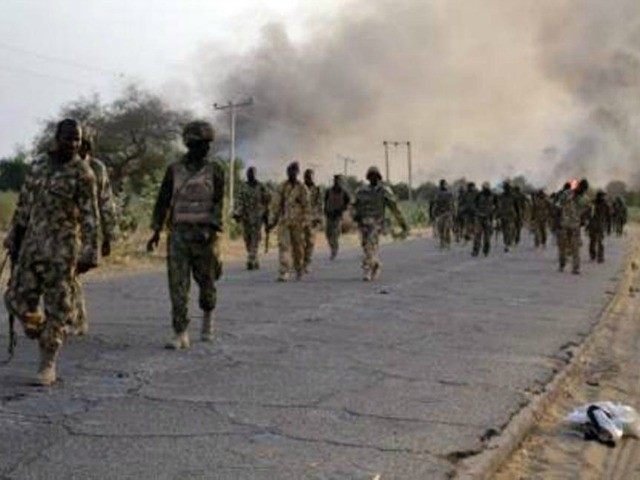The government of Nigeria has claimed for months that the Islamic State (ISIS/ISIL) affiliate Boko Haram has been defeated. Yet military campaigns continue, and this week, the army began bombing the Sambisa forest, a largely inaccessible plot of land known as the terrorist group’s last hideout.
Army Public Relations Director Col. Sani Usman told journalists that the campaign to weed Boko Haram elements out of the Sambisa forest in northeastern Borno state had begun, and that neighboring communities should be on alert for fleeing terrorists. “This is to inform the public that due to aerial bombardment and concerted efforts of the ground troops; and facing imminent annihilation, Boko Haram terrorists have been deserting Sambisa forest in droves,” Usman said in a statement, asking Nigerians to “be more vigilant and security conscious.” He added:
The cowards are running away from their well noted enclave in Sambisa forest for their lives. … The public are please requested to be observant and report any suspicious persons or group of persons to the military or any of the security agencies to enable timely detection and apprehension of the fleeing insurgents before they mingle with the society and commit havoc.
The Sambisa forest is believed to be the last remaining stronghold of Boko Haram and its hiding place for the hundreds – if not thousands – of women and children abducted from northern villages raided and razed to the ground. While the whereabouts of the 219 Chibok schoolgirls kidnapped in April 2014 is still unknown, reports throughout the past two years suggest they may be somewhere in the forest.
With the second anniversary of the Chibok raid on Thursday, the group Bring Back Our Girls, organized by the parents and other relatives of the girls, is demanding the government take further action to find them. “On Jan. 14, we met with President Mohammadu Buhari and he promised to open an investigation into the abduction of these girls,” Bring Back Our Girls representative Sesugh Akume told Nigeria’s Vanguard. “Opening that investigation will lead to credible intelligence that will lead to the rescue of the Chibok girls.”
While the Nigerian government continues to announce liberation raids against Boko Haram, freeing up to 1,200 captives at a time, the location of the Chibok girls remains a mystery. Nonetheless, the government’s effort to declare the war on Boko Haram over continues.
On Tuesday, the Nigerian military released a video depicting airstrikes in Kangarawa, a Borno region housing a Boko Haram logistics base. The military claims the base was completely destroyed.
The governor of Borno has claimed Boko Haram is no longer a major concern. “Yes, we still have occasional hiccups, but Boko Haram has been so decimated that they can no longer threaten the corporate existence of Nigeria,” Governor Kashim Shettima said earlier this week, asserting that “Borno is now free” of terrorism. The federal government appears so confident that Boko Haram’s ability to operate has been reduced sufficiently that it has opened its first rehabilitation facility for terrorists who surrender and seek to develop trade skills and reintegrate into society.
The state of Boko Haram’s leadership remains unclear. In early April, a video surfaced showing a man identifying himself as Abubakar Shekau, the head of the terrorist group, appearing gaunt and describing the video as a “farewell.” Two days later, a second alleged Boko Haram video appeared on social media, a much higher-production project in which masked jihadists declared there will be “no surrender” for the group, while not mentioning Shekau at all. The second video appeared more visually akin to the group’s productions since joining the Islamic State, though some have accused the men in the video of being “paid actors” looking to extort the Nigerian government.
The group still stages dozens of bombings throughout the region, however. A UNICEF report published this week alleges that the use of minors as suicide bombers by Boko Haram has skyrocketed in the past year.

COMMENTS
Please let us know if you're having issues with commenting.